The landscape of preclinical neuroscience research is shifting. Growing ethical considerations, cost pressures, and translational limitations have accelerated interest in organoid alternatives to animal models in neuroscience. While animal models have long served as the foundation for safety and efficacy testing, emerging human-relevant systems—particularly 3D neural models—are increasingly being explored as complementary tools.
Blog
Posts by Diagnostic Biochips:
Reproducibility Problems in Brain Organoid Functional Assays
Reproducibility remains one of the most persistent challenges in brain organoid research. While protocols for generating organoids have improved, achieving consistent and comparable functional measurements across experiments, laboratories, and time points is still difficult. Reproducibility in brain organoid assays is especially complex when measuring neural activity, where biological variability and technical differences intersect.
What Makes a Translationally Relevant Functional Readout?
In brain organoid research, measuring neural activity is only part of the story — the real question is whether those measurements meaningfully reflect human biology. A translationally relevant functional readout is one that reflects mechanisms, responses, or behaviors that meaningfully connect experimental models to real neurological function.
Common Challenges Measuring Neural Activity in Brain Organoids
Measuring neural activity in brain organoids is often more difficult than generating the organoids themselves. Many researchers can successfully grow complex 3D neural tissue, but translating that structural model into reliable functional data is far less straightforward. From limited access to active regions and variability between samples to the technical demands of electrophysiology and imaging workflows, multiple factors can make organoid functional assays difficult to implement and interpret. Recognizing these challenges is an important step toward improving how neural activity is...
Electrophysiology vs Imaging in 3D Neural Models
As 3D neural models such as brain organoids become more widely used, researchers increasingly face a key methodological question: should functional activity be measured using electrophysiology or imaging-based approaches? Both techniques are used to study neural function, yet they provide fundamentally different types of information—particularly in complex 3D tissue.
How Do Researchers Measure Functional Activity in Brain Organoids?
Brain organoids are increasingly used to study human neural development and disease, yet functional activity is still not routinely measured in many organoid studies. Validation often focuses on structure, marker expression, or cell-type composition, while direct assessment of circuit activity remains limited or absent altogether.
Why Electrophysiology Matters for Brain Organoid Disease Modeling
Brain organoids are a popular new way to model human neurological disease, offering advantages over traditional 2D cultures and animal models. They capture key aspects of brain architecture and cell diversity—but structure alone does not tell the full story.
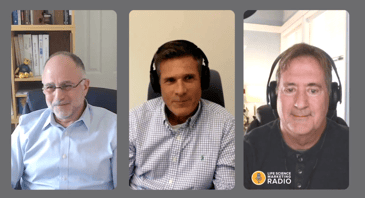
Creating a Market for Disruptive Tech: Lessons from the Diagnostic Biochips Journey
When you're building something truly new, your biggest challenge isn’t competition—it’s proving a market even exists. In a recent podcast episode, Brian Jamieson (CEO, Diagnostic Biochips) and go-to-market expert Chris Morrison break down what it takes to sell disruptive technology like SomaFocus.Chris describes the “innovation death spiral”: a startup gets one early customer, builds a strategy around that win, and burns through resources when it doesn’t scale. One customer isn’t validation—it’s an outlier.Instead, Diagnostic Biochips took a discovery-based approach. After testing assumptions...
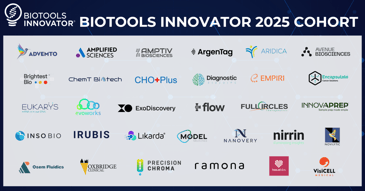
DBC Selected for BioTools Innovator 2025 Cohort
We are pleased to announce that Diagnostic Biochips has been selected to be a part of the BioTools Innovator 2025 Cohort. We are one of 31 companies selected from over 400 applicants for the Accelerator Program. "Based in Los Angeles, BioTools Innovator was established to advance cutting-edge research and improve human health by accelerating the growth of a broad spectrum of life science tools and diagnostics. BioTools Innovator matches industry leaders with innovative early-stage and emerging growth biotechnology-focused companies for mentorship and support."We look forward to attending the...
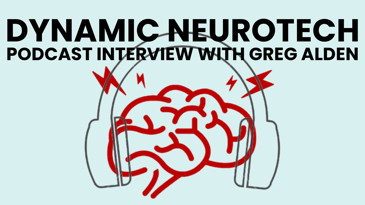
Dynamic Neurotech Podcast Interviews Greg Alden
In an interview with Greg Alden, CEO of Diagnostic Biochips, hosts Robert Murcko and Yuqing Wang discuss his career path and expertise he brings to DBC. They have a conversation talking about everything from the future of neurotechnology innovation, Greg’s journey into the field (in part sparked by his diagnosis with a neurological condition), management principles for a technical organization, and more! Watch the recording here:
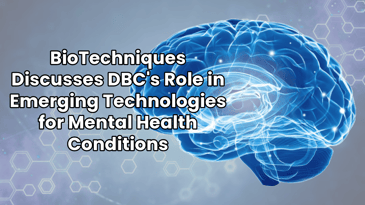
Diagnostic Biochips Plays a Pivotal Role in Emerging Neuro Technologies
As populations age across the globe, the resulting issues span from healthcare to economics, driving extensive research into age-related conditions like neurodegeneration. This has significantly advanced our understanding and treatment of disorders such as Alzheimer's and dementia. However, a surge in mental health disorders, particularly in Western countries, has also garnered attention. Conditions like major depressive disorder (MDD) and substance use disorder (SUD) are now receiving the scientific focus they deserve, thanks to an increased awareness and the development of new technologies.

Dr. André Bastos hosts MaDeLaNe Workshop
Last week, Dr. André Bastos, a professor and researcher at Vanderbilt University, hosted a workshop to discuss his novel data analysis approach. The Multi-Area, high-Density, Laminar Neurophysiology (MaDeLaNe) workshop consisted of 25 participants from various backgrounds and levels of expertise. The MaDaLaNe technique aims to tackle the problem of how to infer the computations that underlie these multi-dimensional datasets.The datasets used in this workshop were generated with DBC's Deep Array from real lab experiments. Participants also utilized DBCloud as a tool for spike sorting, AI...

A No-Brainer: Organoids for Neuroscience Research

BioTechniques Discusses Michael Long's Research
Dr. Michael Long recently had an interview with BioTechniques to discuss his research and how DBC gives him the tools he needs to succeed!"What I love about [DBC's probe] is it has a ton of channels, we can get a ton of neurons, they're really stable, but it can't break. So it's on a piece of metal that at worst will bend and perhaps flex, which I think is actually a good thing. You can imagine a shock absorber, right? If there's any movement of the brain – and there's plenty of movement of the brain – or any movement of the patient, it's absorbed by this kind of wispy, bendable electrodes....
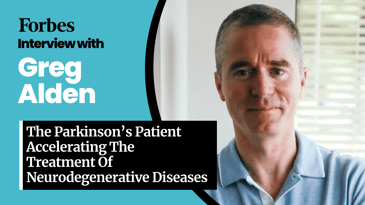
Forbes Interview with Greg Alden, CEO and President
Forbes recently sat down with Greg Alden, CEO and President of Diagnostic Biochips, to discuss his career, how he brings his unique perspective as a Parkinson’s patient to DBC’s work, and the latest on the treatment horizon for neurodegenerative diseases.
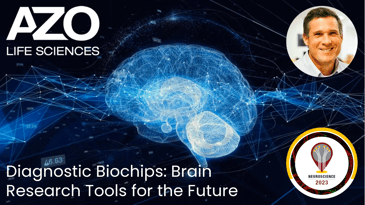
Brian Jamieson's Feature in AZoLifeSciences
AZoLifeSciences' interview with our Founder and CTO, Brian Jamieson, highlights his journey to found Diagnostic Biochips and the goals for the company's future. Brian discusses the fast-growing world of neural electrophysiology and how DBC paves our way in the market for researchers studying brain diseases and disorders. He notes that DBC sets itself apart by creating tools like the Deep Array to access deeper structures in the brains of larger animals, and eventually, humans. Currently, there is an extremely limited number of research tools that allow scientists to observe the deep brain at...
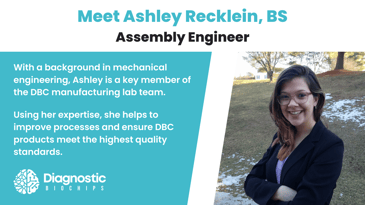
Meet DBC's Assembly Engineer Ashley Recklein, BS
In the manufacturing lab at Diagnostic Biochips, Ashley Recklein adds her touch to perfect the assembly of probes before they ship to our customers. With a bachelor's degree in Mechanical Engineering from the University of Maryland and previous work at a Med-Tech start-up developing point-of-care diagnostics devices, Ashley's expertise ensures DBC provides the best quality to our users. She also works to improve the processes in place for more efficient probe packaging and is occasionally involved in research and development projects.
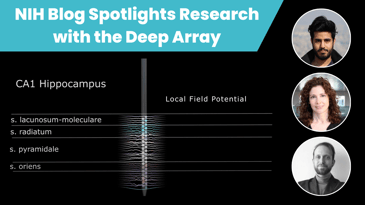
NIH Blog Spotlights Research with the Deep Array
A recent blog post by the National Institutes of Health (NIH) spotlights the video that received first place in the 2023 BRAIN Initiative Contest. The winning entry, titled "Simian Symphony," takes us into the fascinating realm of neuroscience, showcasing the innovative use of DBC's Deep Array technology by neuroscientist Saman Abbaspoor in the lab of Kari Hoffman at Vanderbilt University, Nashville.
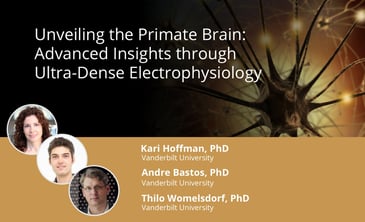
Webinar: Unveiling the Primate Brain: Advanced Insights through Ultra-Dense Electrophysiology
In this recent webinar, Drs. Kari Hoffman, André Bastos, and Thilo Womelsdorf presented their research on the neurophysiological basis of learning, cognition, and sensory processing, including attention and connectivity between brain regions in non-human primates.
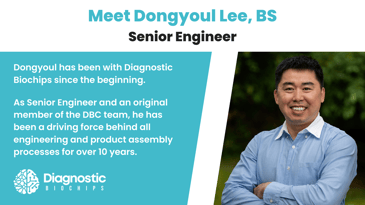
Meet Dongyoul Lee, BS, Our Senior Engineer!
If you have ever recorded using one of our probes or arrays, Lee is the one to thank for that product's assembly. As our Senior Engineer, Lee has dedicated over 10 years of his career to the success of DBC by being one of the original employees and kick-starting all engineering processes. Lee remembers the first years at DBC being filled with all kinds of successes and failures as he worked to perfect the products. He notes there were many times he almost gave up making new devices, but with continuous persistence and determination his efforts started working in his favor and he felt proud to...
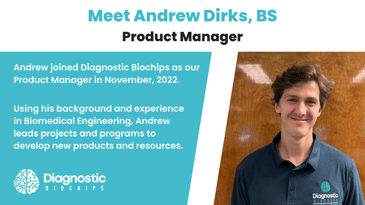
Meet DBC's Product Manager Andrew Dirks, BS
We are pleased to introduce Andrew Dirks, BS who joined the Diagnostic Biochips team as our Product Manager in November 2022.He utilizes his degree in Biomedical Engineering from the University of Delaware and years of experience leading projects and programs to aid in developing the products and resources at DBC. Before his time at DBC, Andrew juggled being a D1 Lacrosse athlete, filing patents for a Monocentric Prosthetic Knee with Adjustable Stance Flexion, and founding a prosthetic technology company where he raised over $25,000 in funding from grants.Andrew plays an essential role here...
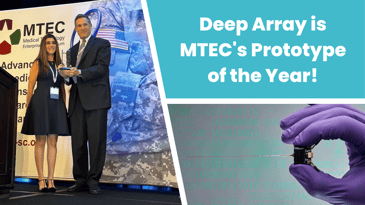
DBC's Deep Array Wins MTEC Prototype of the Year Award
Diagnostic Biochips is pleased to announce that the Medical Technology Enterprise Consortium (MTEC) has recognized “Deep Array” as their Prototype of the Year, among the work of all funded entities.
Deep Array is DBC’s high density, multichannel electrode system for interfacing with deep brain structures in non-human primates (NHPs) and humans (research use only). Specifically, this project involved the prototyping and demonstration of key elements of a visual prosthesis appropriate for targeting thalamic structures, with the eventual goal of restoring sight to the blind.
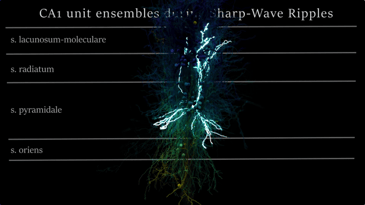
A Simian Symphony: 1st Place 2023 Brain Initiative "Show Us Your Brains" Contest
Kari Hoffman is the Principal Investigator in the Perception Plasticity & Learning Lab at Vanderbilt University, and studies the neural mechanisms underlying perception and memory formation. As a pioneer in freely-moving recordings, she was an early adopter of the DBC Deep Array due to its ability to record from deep structures in the NHP brain, while providing dense recording sites and enabling single neuron resolution across hippocampal layers.
Recently, Kari and her student Saman Abbaspoor collaborated with Tyler Sloan at Quorumetrix Studios to create a visual and auditory representation...
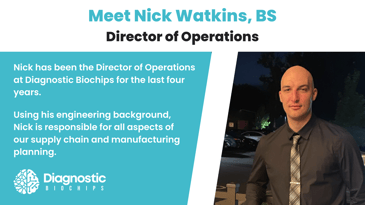
Introducing Nick Watkins, Director of Operations
If you have ever had the pleasure of getting great data from a DBC probe or array, it is likely that Nick Watkins had a hand in it. For the last four years, Nick has served as our Director of Operations here at DBC. He started working for our CTO and Founder, Brian Jamieson, from a random assignment to shadow a company at work for a day while still in high school. Brian tells the story of how he assigned Nick a project to research and present on by the end of the day. While his friends were enjoying a relaxing day off school, Nick was researching. Brian remembers that Nick nailed it.
Nick...
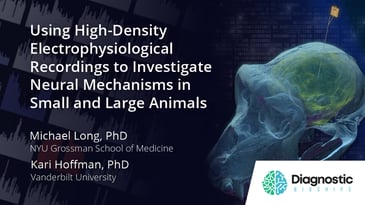
Webinar: Exploring Neural Mechanisms with High-Density Probes
In a recent webinar, Dr. Michael Long from the NYU Grossman School of Medicine and Dr. Kari Hoffman from Vanderbilt University presented their work investigating the neural mechanisms of learning, memory, and behavior using high-density silicon probes from Diagnostic Biochips in small and large animals.
Watch the full webinar here:
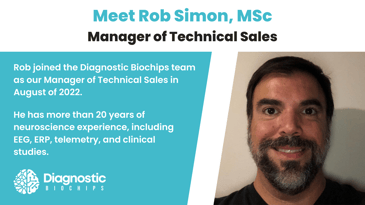
Introducing Rob Simon, Manager of Technical Sales
We'd like to introduce Rob Simon, our Manager of Technical Sales here at DBC.
Rob received his MS from Penn State University where he studied EEG patterns in humans who had previously experienced brain trauma. He brings more than 20 years of neuroscience experience, including the cognitive and clinical neurophysiology fields. Prior to joining the DBC team, and during his time with the Neuroscan division of Compumedics USA, Rob helped set up numerous labs with EEG and ERP systems and provided guidance in the usage of source analysis in the clinical domain. While at Neuralynx, he also aided...

Thalamus drives vocal onsets in the zebra finch courtship song
Felix W. Moll and colleagues from Michael Long’s group at NYU recently published an outstanding paper in Nature titled “Thalamus drives vocal onsets in the zebra finch courtship song” featuring Diagnostic Biochips high-density silicon probes.
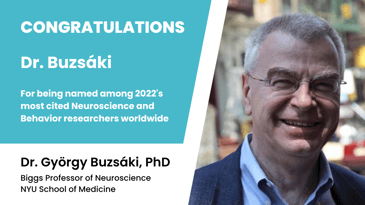
Dr. György Buzsáki Among 2022's Most Cited Researchers
György Buzsáki has been named among 2022’s most cited researchers worldwide, making him one of twenty-three NYU professors named and ranking in the top 1% of citations in their field over the past decade. Dr. Buzsáki is one of fourteen faculty members from the Grossman School of Medicine included in the list, making it the NYU school with the most nominations. Congrats, Dr. Buzsáki!
Click here to learn more about the Buzsáki lab's cognitive neuroscience research.
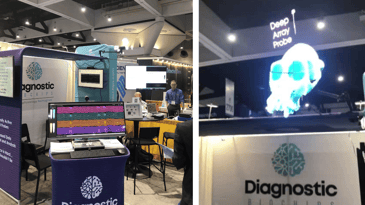
DBC at SfN 2022 in San Diego
From November 12-16 the Society for Neuroscience annual meeting was held in San Diego, marking the event's first return to in-person sessions since 2019. The Diagnostic Biochips team was there, and had the opportunity to share information on our new subscription plan - learn more about how you can save on probes and get free access to the new DBC Cloud platform here! We also shared details on our full product line and had a chance to hear about the incredible work being done with our probes and by the greater neuroscience research community in general. Thank you to everyone for dropping by...
